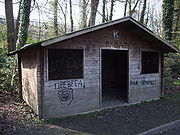
Preved
Encyclopedia


Padonkaffsky jargon
Padonkaffsky jargon or Olbanian language is a cant language developed by padonki of Runet. It started as an Internet slang language originally used in the Russian Internet community...
, a meme
Internet meme
The term Internet meme is used to describe a concept that spreads via the Internet. The term is a reference to the concept of memes, although the latter concept refers to a much broader category of cultural information.-Description:...
in the Russian-speaking Internet which developed out of a heavily-circulated picture, and consists of choosing alternative spellings for words for comic effect. The picture, a modified version of John Lurie
John Lurie
John Lurie is an American actor, musician, painter and producer. He is co-founder of The Lounge Lizards, a jazz ensemble. Lurie has acted in 19 films including Stranger than Paradise and Down by Law, composed and performed music for 20 television and film works, and he produced and starred in...
's watercolor Bear Surprise
Bear Surprise
Bear Surprise is a watercolor painting by American painter John Lurie, the style of which has been described as primitivist and naïve. The painting depicts a couple having sex in a meadow, with a bear standing in front of them, with fore paws in a distinctive position...
, whose popularity was stoked by emails and blogs, features a man and a woman having sex in the clearing of a forest, being surprised by a bear calling "Surprise!" with its paws raised. In later Russian adaptations, the bear shouts "Preved!" (a deliberate misspelling of privet, – "hi!"). In keeping with a popular trend of image manipulation
Image macro
In Internet culture, an image macro is a picture captioned with superimposed text for humorous effect.-Internet forums:On Internet forums and imageboards, image macros are used to emphasize a certain phrase by superimposing it over a related picture.-Formats:Although they come in many forms, the...
, the iconic bear (dubbed Medved (a misspelling of – bear)) has been inserted into many other pictures where his appearance adds a new dimension to the joke.
The word and the bear image have found their way into the mainstream mass media, such as a poster for the Russian edition of Newsweek
Newsweek
Newsweek is an American weekly news magazine published in New York City. It is distributed throughout the United States and internationally. It is the second-largest news weekly magazine in the U.S., having trailed Time in circulation and advertising revenue for most of its existence...
. On July 6, 2006 there was an online conference of Vladimir Putin
Vladimir Putin
Vladimir Vladimirovich Putin served as the second President of the Russian Federation and is the current Prime Minister of Russia, as well as chairman of United Russia and Chairman of the Council of Ministers of the Union of Russia and Belarus. He became acting President on 31 December 1999, when...
prior to which the question "PREVED, Vladimir Vladimirovich! How do you regard MEDVED?" became the most popular, with 28424 votes. No answer was given, but the Associated Press
Associated Press
The Associated Press is an American news agency. The AP is a cooperative owned by its contributing newspapers, radio and television stations in the United States, which both contribute stories to the AP and use material written by its staff journalists...
, informing on the questions collection process, reportedly interpreted it as a reference to then-vice-prime-minister Dmitry Medvedev
Dmitry Medvedev
Dmitry Anatolyevich Medvedev is the third President of the Russian Federation.Born to a family of academics, Medvedev graduated from the Law Department of Leningrad State University in 1987. He defended his dissertation in 1990 and worked as a docent at his alma mater, now renamed to Saint...
. (The third most popular question was "How does one patch KDE2 under FreeBSD?
How does one patch KDE2 under FreeBSD?
"How does one patch KDE2 under FreeBSD?" is an internet meme in Russian Internet culture. The question was originally posted on the #anime channel of the RusNet IRC network on May 8, 2004...
".)
Eventually, it has become known that the author of the altered picture with the word "preved" was user Lobzz from site Dirty.ru, real name Roman Yatsenko. The authorship of the word itself is still unclear, although the "unfinished" version, "prevet" was traced to 2003.
Preved is identified by a specific pattern of alternate spelling which emerged from the word. In this pattern, voiceless consonants
Voice (phonetics)
Voice or voicing is a term used in phonetics and phonology to characterize speech sounds, with sounds described as either voiceless or voiced. The term, however, is used to refer to two separate concepts. Voicing can refer to the articulatory process in which the vocal cords vibrate...
are replaced with their voiced counterparts, and unstressed
Stress (linguistics)
In linguistics, stress is the relative emphasis that may be given to certain syllables in a word, or to certain words in a phrase or sentence. The term is also used for similar patterns of phonetic prominence inside syllables. The word accent is sometimes also used with this sense.The stress placed...
vowels are interchanged pair-wise – a and o stand in for each other, as do e and i. The words (uchasneg, a misspelling of , "user" or "participant"), preved itself, and (kagdila, a misspelling of , "how are you") illustrate this pattern.
The larger trend of alternate spellings, called "olbansky yazyk" ("Olbanian language", misspelled "Albanian") developed from the padonki
Padonki
Padonki is a counter-culture subculture within the Russian-speaking Internet community most famous for using their slang Olbanian language or padonkaffsky jargon...
movement which originated on sites such as udaff.com. That trend uses the opposite conversion from the Preved trend – voiced consonants are replaced with their voiceless counterparts (which are sometimes doubled). For vowels, o is replaced with a and e with i. For example, (ávtor, "author") would be spelled (áfftar) or (áftar). The latter exhibits a sort of eye dialect
Eye dialect
Eye dialect is the use of non-standard spelling for speech to draw attention to pronunciation. The term was originally coined by George P. Krapp to refer to the literary technique of using non-standard spelling that implies a pronunciation of the given word that is actually standard, such as...
.
External links
- http://www.johnlurieart.com Home page for John Lurie's art.
- http://www.preved-medved.deviantart.com the DeviantArtDeviantArtdeviantART is an online community showcasing various forms of user-made artwork. It was first launched on August 7, 2000 by Scott Jarkoff, Matthew Stephens, Angelo Sotira and others. deviantArt, Inc...
community about Preved - Online transformation of standard Russian into Internet slang

